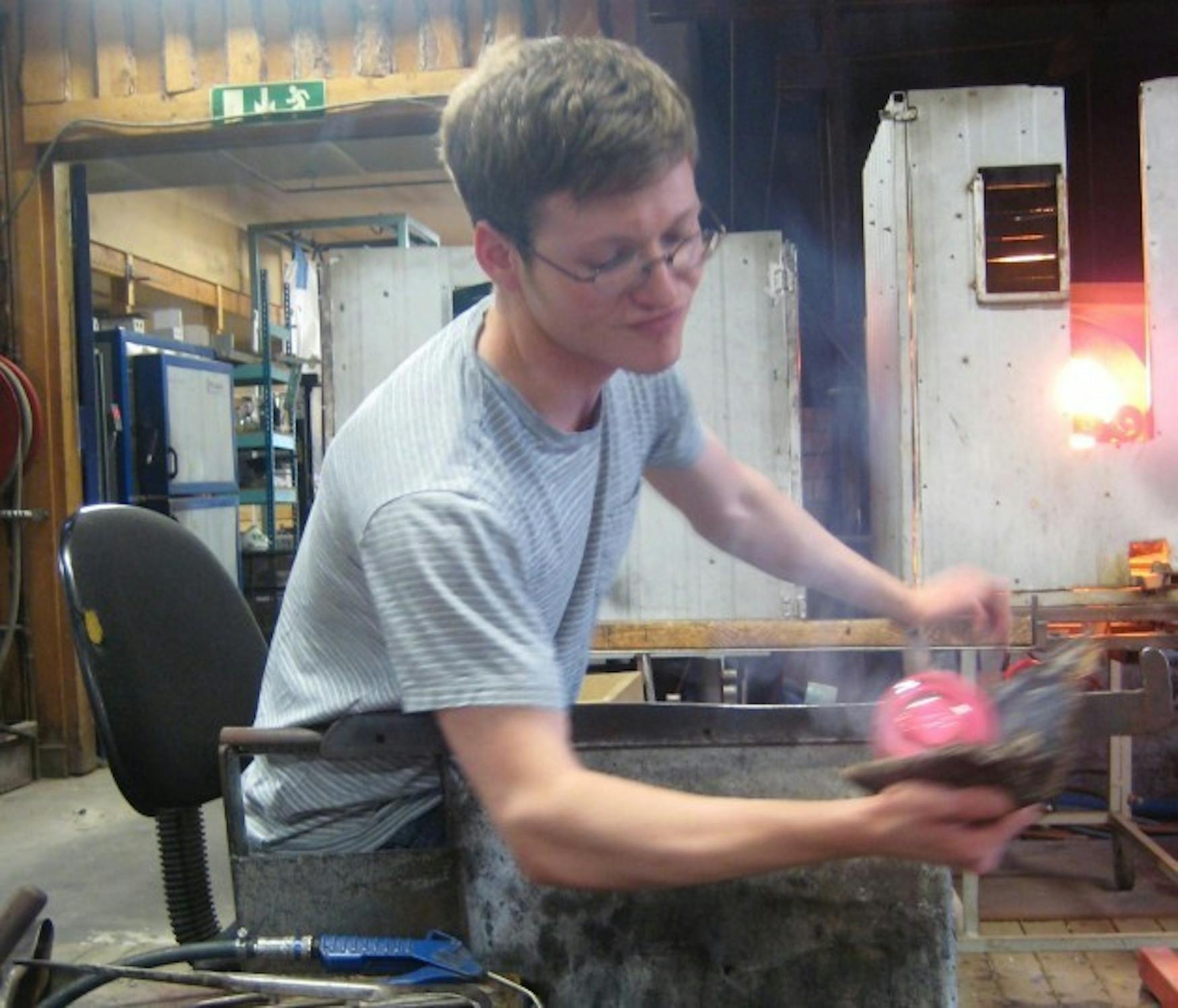Pursuing art abroad
Julian Olidort i11 explores the glassblowing industry in Sweden
While most 11-year-olds spend their summers running around outdoors, swimming in the neighborhood pool and hanging out with friends, Julian Olidort '11 spent his summers as a kid learning the art of glassblowing at Buck's Rock Camp. Despite getting heat exhaustion on his first attempt molding glass at a temperature of about 2,400 degrees Fahrenheit, Olidort has since spent his time pursuing his passion and this year is studying glassblowing in Sweden as a Fulbright scholar.
Over the course of his undergraduate studies at Brandeis, Olidort, a triple major in Economics, European Cultural Studies and English and American Literature, became interested in the history of the Swedish glass industry and how it has evolved to the present day.
"I did this independent study that looked at the history of Swedish glass in European modernism and how it developed out of an art history," Olidort says.
"That research was picked up by a glass museum here, the Swedish Glass Museum, and the way Fulbright works is you get an invitation from a host institution, so they were nice enough to invite me for the year to continue my research," explains Olidort.
He then spent the next few months perfecting his personal statement, research proposal and letters of recommendation for the Fulbright Scholarship, which is designed to "increase mutual understanding between the people of the United States and the people of other countries," according to its website.
Olidort's research proposal, which he wrote in summer 2010, introduces his idea "to study the history of the Swedish glass economy and look at how it developed and why it's in decline right now," he says. Following a lengthy process, Olidort was accepted as a Fulbright scholar to journey to Sweden this September.
Now he is spending the year in Sweden blowing glass in "a traditional setting, getting some hands-on experience in the glass community," he says. He is also continuing his research, though it has evolved more to "looking at the evolution of consumer interest and consumer education and … how [glass factories] have evolved to interact with this change," says Olidort.
As a Fulbright scholar, Olidort says he has the responsibility to "really represent our country and to give it a positive image in the world of education among students." He regularly travels up to Stockholm and meets with the Fulbright embassy in Sweden to discuss how his research is going.
Olidort is currently living in Växjö, a forest region in the south of Sweden. "The glass community and industry have a special name here called the Kingdom of Crystal because it's such a unique cluster of glass factories in one region," says Olidort.
"One hundred years ago, the industry first developed here when the Swedish Council of the Arts part of the government here had a way to stimulate both supply and demand of the designer art glass, which was kind of a revolution," he adds. The popularity of glassblowing soon spread to other countries, and the Kingdom of Crystal became an internationally recognized center of glassblowing.
Because of the recent decline in the demand for hand-blown artistic glass, Olidort says his research "is really focused on evaluating how the companies are doing something similar today, trying to stimulate demand for their product. I'm kind of straddling the history and modern-day industrial equivalent," explains Olidort. He spends his time blowing glass in various factories and traveling around to different areas of Sweden to experience the culture as well.
"I'm traveling around to the glass factories, and I've been blowing glass at a few of them as a guest. They invite me to be a guest assistant, and we hang out," he adds.
He also has an office at the glass museum where he talks to his supervisor, who works as the curator of glass at the museum. He also spends time traveling to different archives to conduct his research.
"The museum has an archive, and some factories have archives that have financial records that I track. I've been pulling out some statistics and also looking at marketing research," says Olidort.
As another aspect of his research, Olidort conducts interviews with various people related to all different angles of the glassblowing industry, including "academics, the professors at the university here, the industry executives [and] some of the business people that are in charge of the glass companies." He has also interviewed students who are studying at the glass school in Stockholm and owners of auction houses that sell glass.
"I'm looking at everybody's perspective on how glass is being produced and how it's being sold," Olidort adds.
With glass being produced at lower costs today by machines or overseas, Western glass factories have become rare, and the glass industry has begun to decline, according to Olidort.
"It's shrinking rapidly for very obvious reasons—the cost to produce glass is rising, and sales fall because people aren't interested in buying glass," Olidort says.
"Sweden is one of the last countries to have a really successful glass industry because they have one thing that others don't: a design history. Design can't be copied by machine," explains Olidort.
As for his plans for the future, Olidort isn't sure what he will do next year, though he hopes to continue glassblowing and possibly pursue a career with the skill.
Interested in "where glass artists come from [and] where they go," Olidort explains that glass artists are "born in the glass schools that are here but don't have a direct route to be a glass blower," much like the situation in which he now finds himself.
For now, he is exploring ideas for further study next year, as well as various career and academic paths both back home in New York and abroad.



Please note All comments are eligible for publication in The Justice.